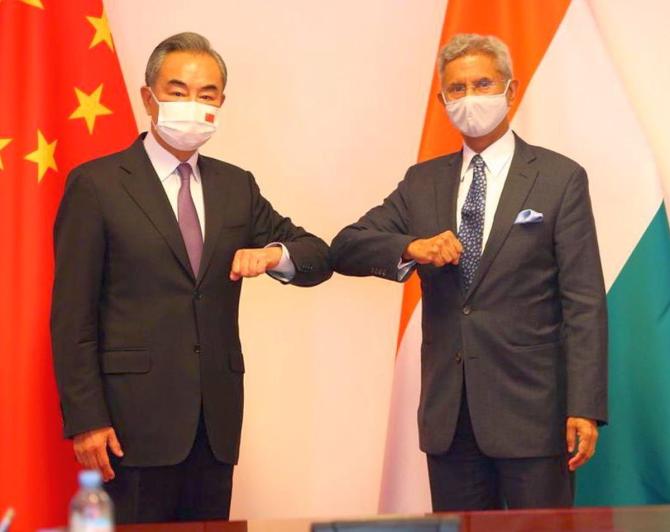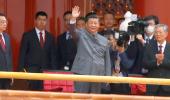'We've never really been in the situation of having a difficult time with the Chinese and an increasingly difficult time with the Russians along with a relationship with the Americans which is important.'

"Since the power gap with China is so big, it will need almost a civilisational change to catch up," Dr Kanti Bajpai, author of the fascinating new book India Versus China: Why They Are Not Friends, tells Rediff.com's Archana Masih in the concluding part of the interview.
- Part I: Could India be heading for a short war with China?
- Part II: 'China will continue to be bossy'
- Part III: 'One of the problems is neither Xi or Modi listen to other opinions'
- Part IV: 'Xi is not interested in settling border issue'
What are the dangers that confront India due to the more entrenched security relationship with the United States?
What repercussions will it have on India's relations with China?
Will it imperil India's defence relationship with Russia given Beijing and Moscow's current proximity?
Definitely there are signs of that problem. The Russians are reaching out to Pakistan and have indicated they might even sell weapon systems to the Pakistanis which will be the first time since the 1960s.
Of course, the Russians want to sell arms everywhere because they need the money, but in part it is because they want to send a message to Delhi as well. 60% of India's weapons still come from Russia and we cannot afford to alienate the Russians.
Ideally, India would want to wean Russia away from its deepening partnership with China -- and one trump card we have is to buy Russian weapon systems. But then the Americans are bearing down on us to stop buying Russian weapons -- while at the same time, America often doesn't deliver on the most advanced American weapon systems.
We're in a very difficult spot. Delhi is doing the best it can to continue the relationship with Russia and at the same time, trying to keep the Americans on our side.
Frankly, we've never really been in the situation of having a difficult time with the Chinese and an increasingly difficult time with the Russians along with a relationship with the Americans which is important.
But we've got a whole bunch of issues to work out with the Americans as well.
- Their reliability in the Quad and in the Indian Ocean area, the pressures on India vis a vis Iran.
- The difficulties we have on their pull-out from Afghanistan.
- The difficulties about trade and the pressures they are putting to open up our markets and make investment easier.
- The difficulty on getting visas for Indian professionals, etc,
India has tricky foreign policy challenges with relations with China on the decline, an increasingly awkward relationship with Moscow, and the difficulties with the Americans from time to time as well.
Given the power asymmetry, you write that India would need a near civilisational change like China did under Mao if it has to catch up?
What civilisational change would this have to be; what form should it take; what will it take to achieve it?
I end the book on the rather sombre note that since the power gap with China is so big, it will need almost a civilisational change to catch up.
The Chinese had their civilisational change in 1949 when the Communists came to power and carried out enormous changes at great cost to their society.
I mention three forms of infrastructure.
- 1. Soft infrastructure.
They built a strong State with a strong bureaucracy which gathers data information and uses it for decision making for long term planning. This has reformed rules, procedures and institutions which in turn has galvanised governmental structures, thereby allowing them to get things done and in turn galvanise society.
China manages to do massive changes through this soft infrastructure which India hasn't.
We're still kind of creaking along with British inherited colonial forms, rules, institutions and procedures. We have a very weak state. We may think we have a big, overbearing government in terms of the numbers of personnel, but we have a very weak State.
You can have all the rules and many pieces of legislation, but ultimately, the government has to enforce those rules. The police, civil service, judiciary has to be big enough to enforce those rules.
The Supreme Court has hundreds of thousands of cases pending, the Indian judiciary has many millions of cases that have not had a judgment.
The IAS has a few thousand officers for a country of 1.3 billion people. There are 560 MPs, one MP for 2 million people! In Sri Lanka, you have one MP for 89,000 people. How can an MP get a handle on his constituency when there are 2 million people on average in his constituency?
India's soft infrastructure India is woefully weak. We think we have a strong state, but we have an extremely weak state compared to China.
- 2. Hard infrastructure -- bridges, roads, railways, airlines, airports. India is weak in these areas, particularly in ports and airports.
There's just no comparison with China on the quality of our roads and railways.
- 3. Lastly and most importantly, if you want good soft infrastructure and hard infrastructure, you have to have good social infrastructure, an emancipated population.
You need to take people of different backgrounds, castes, religions, classes and emancipate them. India is still a rural country of its villages and small towns.
Most of Asia has passed the 50% mark in terms of people living in cities and towns. Pakistan, maybe is almost 70%, urban; India is 35%-40% urban.
You cannot build an emancipated country and society on a rural population. Emancipation occurs in cities and towns.
A great power cannot be built on a population that is still living off the land. Instead, they must live off manufacturing and services in the cities where they are literate, are emancipated from traditional bonds.
India is still an agriculture-bound country where the population is bound to the land, socially, psychologically and culturally.
I'm not talking about going back to some golden age of India.
China made its civilisational move of openness, social infrastructure, emancipation -- economic, social and political change when the world was going towards economic openness and climate change was not upon us.
But India has to grow economically and emancipate its people at a time when it's going to be hit by the worst years of climate change as well.
This civilisational change has to be emancipatory, ecological and experimental.
I don't think we're there.
Feature Presentation: Aslam Hunani/Rediff.com











 © 2025
© 2025